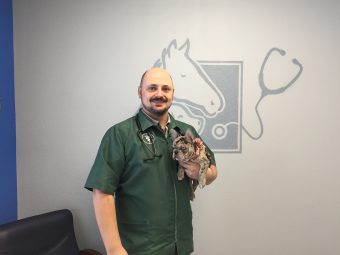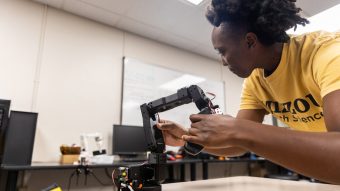Feb. 16, 2021
Contact: Sara Diedrich, 572-8823243, diedrichs@missouri.edu

The Lebanon Veterinary Clinic had only been open for a few weeks when David Sikes received a desperate call from a dog breeder. His animals were falling sick, and some were dying. He needed help immediately.
It was just days before Christmas 2020. Sikes was still settling into his new practice, but calls like this were among the many reasons he attended the University of Missouri College of Veterinary Medicine: to help animals – and by extension, the people who care for and love them.
Sikes did what he was trained to do.
“I told the owner I would do my very best and try to find out why his dogs were dying,” he said.
Little did Sikes know that his call of duty would lead to a string of connections between him, an MU veterinary toxicology expert and another MU veterinary college alumna, resulting in the voluntary recall of a line of dog food, which by extension, saved the lives of potentially hundreds, maybe thousands, of pets.
“It doesn’t get much better than this when it comes to showing the strong relationships we build with our students and with governmental and business industries,” said Tim Evans, an associate professor in the MU College of Veterinary Medicine and head of the toxicology section in MU’s Veterinary Medical Diagnostic Laboratory (VMDL).

Evans was the expert who reached out to the Missouri Department of Agriculture and the Food and Drug Administration to sound the alarm about the suspect food produced by Midwestern Pet Foods, Inc. The company voluntarily recalled the Sportmix brand pet food on Dec. 30, 2020, and the FDA issued a warning about the pet food. The case remains under investigation by the FDA, and the FDA is aware of more than 110 pets that died after eating the food.
In the days before the recall, however, Sikes and his staff spent hours at the breeding facility, trying to uncover the cause of the problem. He began with the systematic practice of veterinary medicine he learned at MU, starting with physical exams of the dogs and a series of tests to give him an overall condition of the animals and what bodily systems were being affected. Next, Sikes created a list of possible causes and began a careful process of elimination.
“The best advice I received at MU was you will miss more by not looking than by not knowing,” he said.
Sikes knew the dogs’ condition wasn’t an accident, injury or genetic condition. An external source was causing liver failure in many of the dogs. With test results still out, Sikes considered what outside elements he could control for the moment: Food, water and a potential zoonotic disease called leptospirosis. All the dogs were started on antibiotics, and the owner was given additional safety precautions to follow.
“Water-borne contaminants were considered and discussed with the owner as a next diagnostic step, if infectious and toxin causes were not identified,” Sikes said.
So, he told the breeder to change the dogs’ food immediately, and he did.
In the meantime, Sikes called Evans, his former professor at MU, to discuss the case and confirm what tissues and special handling requirements were needed for toxicologic screening, if another patient should die.
Turns out, Sikes’ hunch about the food was right: Evans’ testing at VMDL showed it contained high, potentially fatal levels of an aflatoxin that exceeded FDA regulations. Aflatoxin is produced by mold that grows on corn and other grains, and the toxin can poison animals.
From there, proper notifications were made, and the dog food was taken off the market.
The Mizzou trifecta came with the involvement of Amber McCoig, another former student of Evans, and the FDA’s deputy director for the Division of Compliance at the Center for Veterinary Medicine. A 2005 graduate of the MU veterinary college, McCoig was actively involved in the investigation from the beginning. She also is an adjunct professor for the MU Department of Public Health and teaches vet student veterinary public health policy.
“I am very lucky to be a part of the MU College of Veterinary Medicine,” she said. “I work with a large group of people who support the mission of protecting human and animal health.”
Sikes said the investigation has been exhausting and heartbreaking, especially for the dog breeder. Still, the experience has shown him the value of strong relationships in times of crisis.
“I never expected to be involved with a nationwide recall, that wasn’t on my career goals,” Sikes said. “Without the help of Dr. Evans and everyone else involved, I don’t think we could have addressed this as quickly as we did.”



